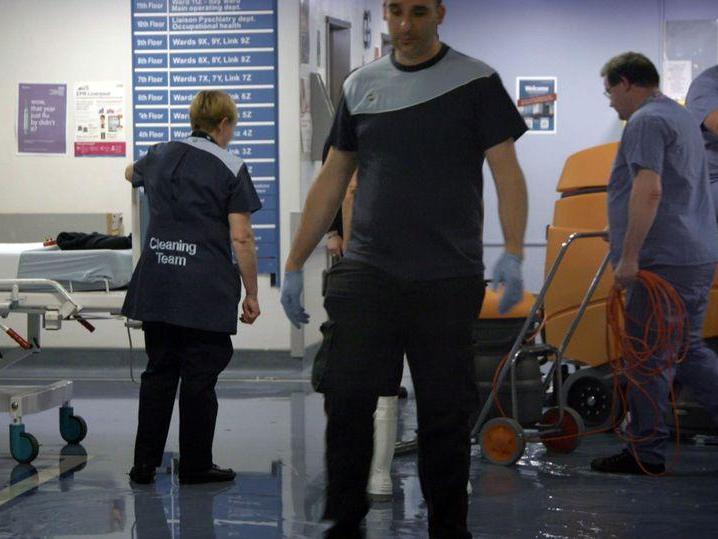Tory cuts leave up to half of hospitals caring for patients amid sewage leaks, collapsing ceilings and stuck lifts, analysis finds
NHS facing a £6bn repair bill as years of cuts push hospitals to rack and ruin and 45 per cent report incidents delaying patient care

The shocking state of the nation’s hospitals has been laid bare in analysis revealing raw sewage running through wards, ceilings collapsing in maternity units and nurses trapped in lifts for hours.
Nearly half of hospital trusts reported patient care had been delayed or disrupted last year as a result of building or equipment issues, according to documents obtained under freedom of information (FOI) requests.
Medical leaders warned these problems were putting operating theatres out of action and creating further delays for the 4.3 million patients stuck on NHS waiting lists, causing their health to deteriorate even further.
Blame for crumbling hospitals has been laid at the feet of ministers who have raided funds from NHS capital budgets – intended for new buildings, repairs and technology – in each of the past five years to keep services running.
Some 76 out of 170 hospital trusts who responded – 45 per cent – had declared a “clinical service incident” in 2018-19 as a result of infrastructure issues.
Among the issues identified were:
- A trust in the Yorkshire and Humber region where a blocked toilet meant that “faeces was coming through the floor” in the ultrasound department over a period of several weeks;
- One London trust which had to shut its A&E department because of a “severe sewage leak”;
- A trust in the northwest of England which had a ward ceiling collapse, a water leak which brought down the ceiling outside the maternity ward, and a broken lift with two nurses trapped inside; and
- Two west midlands trusts where a severe leak in the roof of a maternity unit soaked equipment and damaged electrical fittings, and a labour ward became too cold to safely care for babies.
Issues with buildings and equipment across the roughly 230 hospital trusts in England have come to the forefront as the government’s austerity drive has demanded swingeing cuts at a time when patient demand is at record levels.
Earlier this year the BBC’s Hospital documentary revealed “slum” conditions created by flooding at Royal Liverpool Hospital which was badly affected by the collapse of contractor Carillion.
Although Theresa May has pledged a £20.5bn funding uplift over the next five years, this has been part-funded by the raids to capital budgets – a move criticised by the government’s own adviser Sir Robert Naylor for hamstringing attempts to modernise the health system.
“Anything that delays treatment further, for example closure of operating theatres due to infrastructure failures, sewage is very worrying,” said a Royal College of Surgeons spokesperson.
“The time spent waiting for surgery can be an exceptionally stressful period in patients’ lives. It can have a huge impact on their quality of life and may lead to a further deterioration in their health.”
Since 2017-18 the “high risk maintenance” backlog identified by hospitals – the cost of addressing the most critical infrastructure issues – has topped £1bn, up from £947m in 2016-17.
But the total bill is six times bigger, and NHS Providers – which represents trusts – said raids on capital funds were no longer sustainable.
“Trusts need urgent access to capital funding to solve the real patient safety and quality concerns that have developed,” said deputy chief executive Saffron Cordery.
Shadow health secretary Jonathan Ashworth, whose party carried out the FOI requests, said: “Years of Tory cuts are pushing hospitals to rack and ruin.
“The NHS now faces a staggering £6bn repair bill, £3bn of which is considered ‘high’ or ‘significant’ risk.
“Patients deserve to be treated in the very best quality health facilities with the most up to date equipment, and yet the Tories have utterly failed to invest in the infrastructure capital budgets.”
A Department of Health and Social Care spokesperson said: “We want patients to receive world-class care so we’re investing £3.9bn to upgrade facilities, which is already improving A&Es, buying cutting edge technology and putting more beds on wards up and down the country.
“The NHS Long Term Plan, backed by an extra £33.9bn a year by 2023-24, sets out ambitions to further modernise the health service over the next 10 years and we will consider capital funding proposals from the NHS in the Spending Review later this year.”
Join our commenting forum
Join thought-provoking conversations, follow other Independent readers and see their replies
0Comments